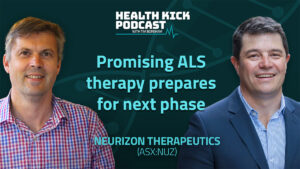Health Check: Biotechs rush to short-term funding fix

R&D advances aren't a funding panacea, but they're a handy form of short-term loot. Pic via Getty
- Advances on research and development tax incentives are proving a popular source of ancillary financing
- Audeara shares surge up to 36% on China deal
- Bell Potter halves its Syntara valuation
With traditional equity fundraising conditions remaining patchy – albeit far from impossible – biotechs are flocking to short-term cash injections by way of research and development (R&D) cash advances.
Specialist lenders advance the funds with the security of the borrower receiving the federal Research & Development Tax Incentive (RDTI).
The RDTI compensates innovators with a 43.5% cash offset for every eligible dollar spent.
The company repays the loans when it pockets this payment, which can be some months after the financial year in question.
New lenders have sprung up to avail of the market opportunity, which applies not just to biotechs.
Today, psychedelic drug developer Tryptamine Therapeutics (ASX:TYP) said it raised $2.6 million, by way of an R&D advance with Rockford Equity Pty Ltd.
The funds will support the company’s trial TRP-8803. This program uses intravenously infused psilocin to treat the difficult binge eating disorder.
The company can elect to drawdown on the facility in $500,000 tranches, accruing interest of 16% per annum on the outstanding balance.
The loan is secured by the company’s expected R&D refund for the 2025-26 year.
As of June 30, Tryptamine had cash of $3.03 million.
Joining the rush
Last month, Neurizon Therapeutics (ASX:NUZ) took out a $1.5 million advance with Radium Capital and Zelira Therapeutics (ASX:ZLD) availed of $650,000 from RH Capital Finance.
In June, Chimeric Therapeutics (ASX:CHM) secured $2.5 million from Endpoints Capital.
Other companies using R&D advances include AdAlta (ASX:1AD), Recce Pharmaceuticals (ASX:RCE), Adherium (ASX:ADR) and Noxopharm (ASX:NOX).
The facilities don’t preclude other fundraisings.
Recce recently raised $15.8 million of equity and took out a $30 million non-R&D loan with Avenue Capital Group of the US.
The funds will support Recce’s Indonesian and local phase III trials of its synthetic antibiotic candidate.
These studies are to treat diabetic foot and acute bacterial skin and skin structure infections.
Investors all ears as Audeara pushes into China
Audeara (ASX:AUA) has signed a deal to sell its hearing aid-style devices in mainland China, which has 1.3 million people and (roughly) double the number of ears.
Audeara has developed headphones that adjust the volume and other levels to the wearer’s individual profile, with the help of algo-based technology.
Over the past two years, Audeara has tweaked its business model from selling its headphones in its own right, to providing the tech to big-ticket international customers.
True to this strategy, the Middle Kingdom push is by way of a licensing agreement with a subsidiary of Taiwan’s Eastech Holding Limited.
The parties signed a letter of intent last September.
The tie-up involves Audeara licensing its tech and provide engineering services to support the development of “advanced hearing devices”.
These gizmos will be sold under a third-party brand and distributed via a “leading Chinese e-commerce hearing aid provider with national reach”.
Audeara says China presents is a “significant market opportunity”, with about 426 million people affected by hearing loss.
This figure is expected to reach 561 million by 2034 – 40% of the population.
Whatever the case investors sure heard the news, with Audeara shares vaulting up to 35% this morning.
Syntara is half the company it used to be
Following Syntara’s (ASX:SNT) FDA setback over the conduct of its proposed myelofibrosis trial, broker Bell Potter has halved its valuation of the company.
This is nice symmetry, give Syntara shares yesterday halved on the grim tidings.
The FDA has advised the company to carry out a placebo-controlled phase IIb trial, rather than skip to a pivotal phase II-III style effort.
The agency wanted extra safety and efficacy data for Syntara’s drug candidate amsulostat, which is intended to be used alongside the standard of care ruxolitinib.
Bell Potter notes the extra trial means clinical development could take four to five years, compared with around three years for the original intended path.
“The upshot is amsulostat is now a phase IIb ready asset rather than phase III-ready,” the firm says.
“This does not at all diminish our view that the data reported to date from the [earlier] phase IIa trial is highly compelling and strongly supportive of future development in myelofibrosis.”
The firm values the stock at six cents compared with 12 cents previously and today’s opening price of 2.8 cents.
Syntara has other trials in myelodysplastic syndrome, skin scarring and a Parkinson’s disease related disorder, but the market has focused on the myelofibrosis program.
Other indications should be child’s play for Mesoblast
Broker Canaccord sees a big opportunity for stem-cell developer Mesoblast (ASX:MSB) to branch into other childhood immune-related diseases.
In December the FDA approved Mesoblast’s maiden product, Ryoncil for steroid-resistant peadiatric graft-versus-host disease.
Mesoblast isn’t currently running any other pediatric trials.
But Canaccord says the company’s mesenchymal stromal cells have a “strong mechanistic rationale” in areas of high unmet need.
This is especially the case when there are safety concerns.
“These include paediatric Crohn’s disease, systemic juvenile idiopathic arthritis, or multisystem inflammatory syndrome in children, where standard of care immunosuppressants are often inadequate or carry significant toxicity risks.”
About 56,000 US children have Crohn’s disease and up to 20,000 of have failed standard therapies.
The firm sees a Ryoncil opportunity of 7000-10,000 of these patients – a circa US$3 billion opportunity.
Mesoblast launched Ryoncil in April and reported gross June quarter revenues of US$13.2 million.
So far the company has signed up 20 transplant centres, with ten patients prescribed the therapy.
“Mesoblast has achieved 220 million covered US lives (commercial and government payers), with limited pushback,” Canaccord says.
The firm assumes peak sales at $206 million a year. This is based on a 50% market share at around US$1.4 million per patient.
The firm values the stock at $2.97 a share a modest increment on the current $2.30 (ish).
This estimate does not factor in the potential childhood indications.
Mesoblast is working on an FDA approval application for adult heart disease variant. It also has an advanced lower back pain program.
At Stockhead, we tell it as it is. While Typtamine, Neurizon, Recce and Audeara are Stockhead advertisers, the companies did not sponsor this story
Related Topics

UNLOCK INSIGHTS
Discover the untold stories of emerging ASX stocks.
Daily news and expert analysis, it's free to subscribe.
By proceeding, you confirm you understand that we handle personal information in accordance with our Privacy Policy.








